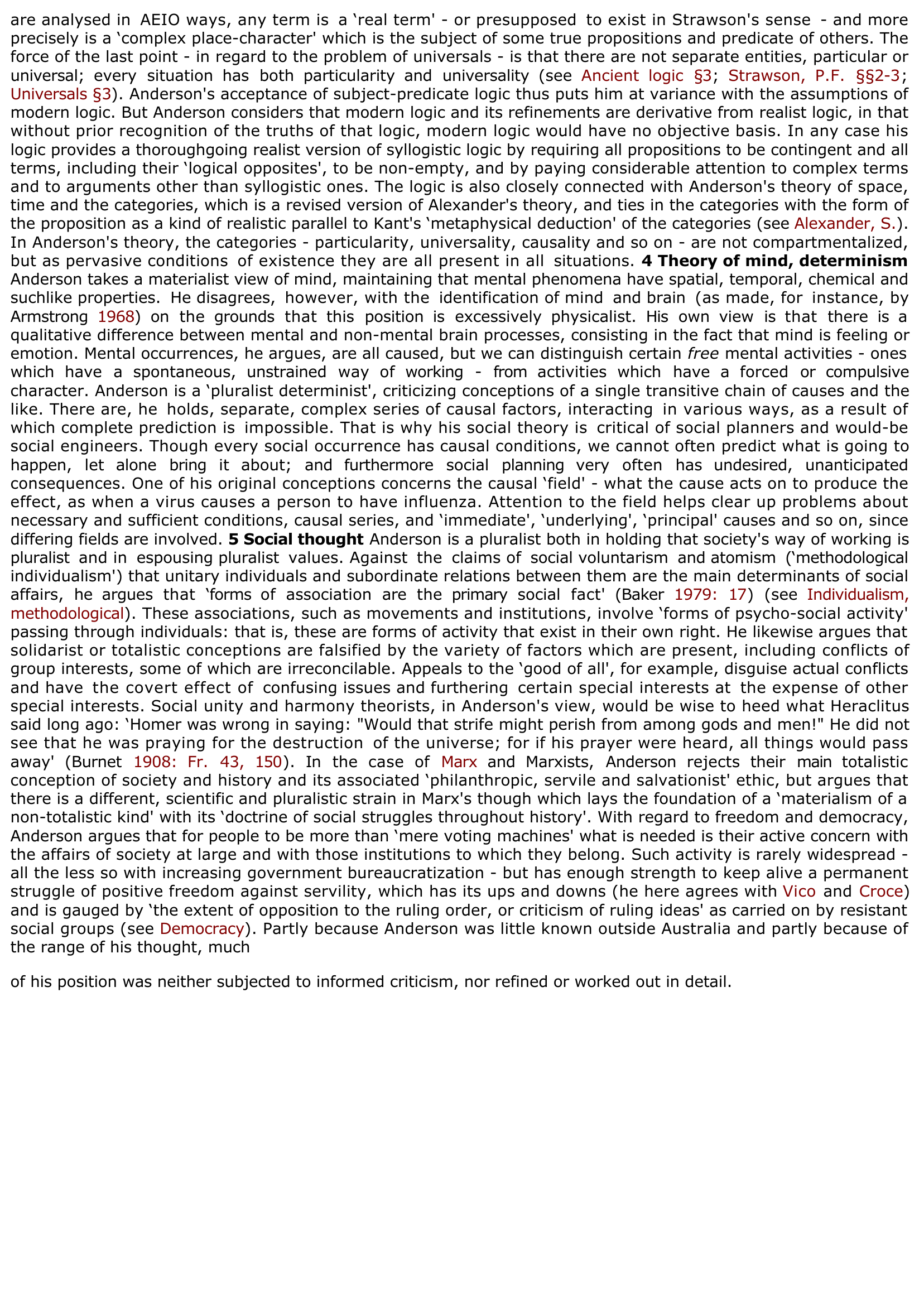Anderson, John
Publié le 22/02/2012
Extrait du document
«
are analysed in AEIO ways, any term is a ‘real term' - or presupposed to exist in Strawson's sense - and moreprecisely is a ‘complex place-character' which is the subject of some true propositions and predicate of others.
Theforce of the last point - in regard to the problem of universals - is that there are not separate entities, particular oruniversal; every situation has both particularity and universality (see Ancient logic §3 ; Strawson, P.F.
§§2-3 ; Universals §3 ).
Anderson's acceptance of subject-predicate logic thus puts him at variance with the assumptions of modern logic.
But Anderson considers that modern logic and its refinements are derivative from realist logic, in thatwithout prior recognition of the truths of that logic, modern logic would have no objective basis.
In any case hislogic provides a thoroughgoing realist version of syllogistic logic by requiring all propositions to be contingent and allterms, including their ‘logical opposites', to be non-empty, and by paying considerable attention to complex termsand to arguments other than syllogistic ones.
The logic is also closely connected with Anderson's theory of space,time and the categories, which is a revised version of Alexander's theory, and ties in the categories with the form ofthe proposition as a kind of realistic parallel to Kant's ‘metaphysical deduction' of the categories (see Alexander, S. ). In Anderson's theory, the categories - particularity, universality, causality and so on - are not compartmentalized,but as pervasive conditions of existence they are all present in all situations.
4 Theory of mind, determinism Anderson takes a materialist view of mind, maintaining that mental phenomena have spatial, temporal, chemical andsuchlike properties.
He disagrees, however, with the identification of mind and brain (as made, for instance, byArmstrong 1968 ) on the grounds that this position is excessively physicalist.
His own view is that there is a qualitative difference between mental and non-mental brain processes, consisting in the fact that mind is feeling oremotion.
Mental occurrences, he argues, are all caused, but we can distinguish certain free mental activities - ones which have a spontaneous, unstrained way of working - from activities which have a forced or compulsivecharacter.
Anderson is a ‘pluralist determinist', criticizing conceptions of a single transitive chain of causes and thelike.
There are, he holds, separate, complex series of causal factors, interacting in various ways, as a result ofwhich complete prediction is impossible.
That is why his social theory is critical of social planners and would-besocial engineers.
Though every social occurrence has causal conditions, we cannot often predict what is going tohappen, let alone bring it about; and furthermore social planning very often has undesired, unanticipatedconsequences.
One of his original conceptions concerns the causal ‘field' - what the cause acts on to produce theeffect, as when a virus causes a person to have influenza.
Attention to the field helps clear up problems aboutnecessary and sufficient conditions, causal series, and ‘immediate', ‘underlying', ‘principal' causes and so on, sincediffering fields are involved.
5 Social thought Anderson is a pluralist both in holding that society's way of working is pluralist and in espousing pluralist values.
Against the claims of social voluntarism and atomism (‘methodologicalindividualism') that unitary individuals and subordinate relations between them are the main determinants of socialaffairs, he argues that ‘forms of association are the primary social fact' (Baker 1979: 17 ) (see Individualism, methodological ).
These associations, such as movements and institutions, involve ‘forms of psycho-social activity' passing through individuals: that is, these are forms of activity that exist in their own right.
He likewise argues thatsolidarist or totalistic conceptions are falsified by the variety of factors which are present, including conflicts ofgroup interests, some of which are irreconcilable.
Appeals to the ‘good of all', for example, disguise actual conflictsand have the covert effect of confusing issues and furthering certain special interests at the expense of otherspecial interests.
Social unity and harmony theorists, in Anderson's view, would be wise to heed what Heraclitussaid long ago: ‘Homer was wrong in saying: "Would that strife might perish from among gods and men!" He did notsee that he was praying for the destruction of the universe; for if his prayer were heard, all things would passaway' (Burnet 1908: Fr.
43, 150 ).
In the case of Marx and Marxists, Anderson rejects their main totalistic conception of society and history and its associated ‘philanthropic, servile and salvationist' ethic, but argues thatthere is a different, scientific and pluralistic strain in Marx's though which lays the foundation of a ‘materialism of anon-totalistic kind' with its ‘doctrine of social struggles throughout history'.
With regard to freedom and democracy,Anderson argues that for people to be more than ‘mere voting machines' what is needed is their active concern withthe affairs of society at large and with those institutions to which they belong.
Such activity is rarely widespread -all the less so with increasing government bureaucratization - but has enough strength to keep alive a permanentstruggle of positive freedom against servility, which has its ups and downs (he here agrees with Vico and Croce ) and is gauged by ‘the extent of opposition to the ruling order, or criticism of ruling ideas' as carried on by resistantsocial groups (see Democracy ).
Partly because Anderson was little known outside Australia and partly because of the range of his thought, much
of his position was neither subjected to informed criticism, nor refined or worked out in detail..
»
↓↓↓ APERÇU DU DOCUMENT ↓↓↓
Liens utiles
- Sir John Anderson (seconde guerre mondiale).
- Anderson, John
- Sir John Anderson
- John Locke et les lois - extrait du Second traité du gouvernement civil
- ANABASE, poème de Saint-John Perse

































